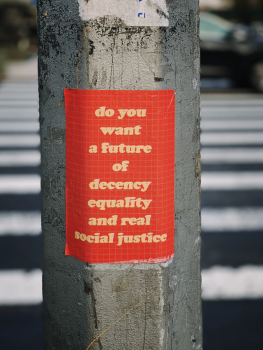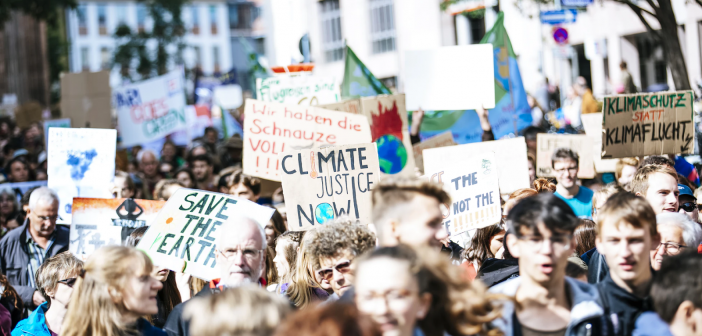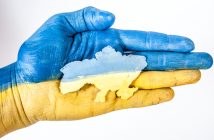What is social justice? Is it protesting for clean water? Is it making sure everyone has affordable healthcare? Is it ensuring that every child has the right to pursue a proper education? It is all of the above and so much more. Social justice goes deeper than what the general public may perceive. It is a human right and insists that we fight for what we truly believe in. It describes a passion for justice and is a tool for self-liberation. We have this one life to do what we believe is right, and social justice activism is at the forefront of ensuring a better quality of life for all.
Should social justice have a part in standard education curriculums? According to S.C. Naser, The International School Psychology Association established social justice and the promotion of social justice as an ethical principle in 2011. This organization also states that the promotion of social justice has historically been defined as an aspirational goal, however modern-day perceptions have defined it as a process to breakdown systems of inequality and to incorporate and advance the equality between all living things.
One example of why social justice framework might be impactful is in a universal school setting aimed to address students’ social, emotional, and behavioral development. Naser’s article about social justice in education states, “legislation in the United States (U.S.) and internationally reflects the growing understanding of educators and lawmakers that universal social, emotional, and behavioral programming is critical to student success.”

Photo by Jon Tyson
To bring it to the local setting, Dr. Dawn Murray, a professor at Antioch University Santa Barbara, has some inspiring words to share. Dr. Murray has been involved with social justice activism since childhood, and has continued to display activism throughout her professional years as an adult. When asked what social justice meant to her, Dr. Murray said “It means a lot. Working to make things more even within a society— the wealth, opportunities, privileges, access to school, jobs, healthcare, clean water, etc. To make it more equal in society and the world.”
Whether it was volunteering at local hospitals and food banks as a child to traveling the world in the hope to provoke change in spots such as Tulum Mexico, the Galapagos Islands, Bhutan, and Costa Rica, Dr. Murray has a strong passion for social justice activism. She spent six months in Bhutan teaching biodiversity and conservation management at the Royal Thimphu College. In addition, she spent six months in Costa Rica teaching math and biology.
Dr. Murray not only displayed activism through teaching, but through preservation of indigenous communities across the world. When she traveled to The Galapagos Islands, Dr. Murray spent one month working with a nonprofit aimed at empowering the local women and children. One year later, she brought a group of students back to The Galapagos Islands to work with the same nonprofit. Dr. Murray also traveled to Tulum Mexico while working to clean up the local beaches. She mentioned that it was difficult getting laws changed around the trash issue, thus resulting in her shifting attention towards the local Maya people. Dr. Murray developed a relationship with the Maya people, and she realized that the locals lacked access to the beaches due to the private hotels and organizations that have bought up all the land. Witnessing this social justice issue, she then shifted her focus towards helping the locals get the access to the beaches they deserve.
Dr. Murray is currently working with the Monpa people of Bhutan, the first indigenous people of the country. The Monpa culture is slowly dying due to the rise of the modern Bhutanese culture. Dr. Murray was introduced to the Monpa people in 2015 during a trip she took to Bhutan. She was informed about their dying culture and the struggle that they had with losing power from their government. Dr. Murray helped celebrate the first-ever Monpa festival back in December of 2019 that celebrated their culture and heritage.
Dr. Murray was asked about whether or not she believes social justice should be taught in schools. She strongly advised for implementation at all grade levels.
“I think you need to introduce social justice in elementary school, again in middle school, and then in high school. You can add to the complexity of the curriculum and the examples you teach depending on the student’s age and cognitive level, but circling back to social justice several times in school curriculum assures a familiarity and potential passion to advocate for issues.” —Dr. Dawn Murray
Just like Dr. Murray, many other people and organizations around the world are practicing social justice activism in hope of making our world a better place. Andre Mabuchi, a Santa Barbara local and a graduate candidate at Antioch University, is taking activism into his own hands. Mabuchi is launching a business called VGBX LLC. VGBX will be an eCommerce site where people can buy customized vegetable planter boxes that will be delivered to their home or business in Santa Barbara. In the words of Mabuchi, “The intention is that we can impact any individuals or families here in SB County that don’t have sufficient access to fresh produce.”
Mabuchi’s mission is to help bridge the gap in the lack of fresh produce that many people experience in Santa Barbara County. Mabuchi is taking a portion of every sale and donating it towards supplying other people in need with his vegetable planter boxes. His long term goals for the business include expanding his vegetable planter boxes into larger settings such as vacant lots and city space, where the maximum amount of food can be grown to support this initiative.

Photo by Markus Spiske
Passionate about food security and social justice, Mabuchi believes that everyone should have equal access to fresh and healthy food. “Why not take the opportunity when starting a business to add something other than strictly profits as your motivating bottom line?” VGBX LLC should be up and running within a month, and you can support Mabuchi and his initiative by staying tuned for what is to come.
A variety of other organizations in the Santa Barbara area promote and display social justice activism and awareness. One organization is the Food Bank of Santa Barbara County. They are working towards eliminating hunger by providing food and education to the community. They provide nutrition education and promote environmental sustainability and community resilience. Anyone can help by donating food or money, volunteering, and spreading the word to create more awareness. You can find their website at https://foodbanksbc.org/what-we-do/.
Another inspiring organization that is local to Santa Barbara County is the Wilderness Youth Project (WYP). The organization focuses on fostering health, confidence, and a love for learning for young people and families through outdoor experiences. WYP teaches about peace, respect, and an appreciation for the environment. Through trips to locations such as creeks, beaches, and mountain trails, WYP promotes individual growth, interpersonal skills, and increased respect for the natural world. You can help by volunteering, and all information can be found at https://wyp.org/.
Advocating for social justice is a privilege we are given here in the United States. Within a democracy, we have the power to voice our opinions and concerns regarding social justice issues. Society must continue to implement social justice education into schools and universities across the world to ensure a ripple effect of awareness. An article written by Robert P. Warner and Cindy Dillenschneider explains, “Social justice education focuses on social responsibility, student empowerment, and equitable distribution of resources by providing students with opportunities to develop the skills necessary to become leaders in increasingly diverse communities.” The more educated we are about these issues, the more likely we are to react and provoke change.
If you are interested in being an advocate for social justice, educate yourself and network with as many people as possible. Some motivating words from Dr. Murray advised us, “Go back to the basics and realize why you were interested in this to begin with. Communicate with as many people as you can to find your inspiration for what you can do. You can’t do activism in a vacuum.”




